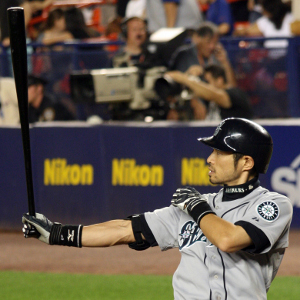Footynomics: the economics of the AFL's future
- Monday, December 28 2009 @ 04:29 pm ACDT
- Contributed by: Christopher P. Adams, Ph.D.
- Views: 12,208


In a recent book titled Soccernomics, the authors, a finance writer and an economist, stated that sporting leagues like the NFL and the AFL were likely be overwhelmed by soccer. “But Aussie rules can exist side by side with soccer. We said in the book that it may be a subsidised folklore festival so it is not my bet but I do think it is a distinct possibility," says one of the authors according to SBS's Matthew Hall. One must worry at the outset that people who love soccer enough to write a book about it might be slightly biased in their opinion, but be that as it may. Does such an idea make sense? Does the economics of it make sense?
Pictured at left is Papau New Guinea as it celebrates winning the 2008 International Cup
Since the early 80s we have seen the AFL/VFL grow from the biggest sporting league in Melbourne to the biggest professional sport in Australia. Since the mid 90s we have seen Australian football grow at a huge rate across the United States, Canada, the UK, continental Europe, and Japan. In the last few years, footy has made great strides in South Africa, Papua New Guinea and New Zealand. This last week, the AFL announced that not one but two separate teams would represent international players at the 2010 U16 National Carnival. For a sport on its last legs it seems to be going out in style!
As someone who has been involved in footy's international development since the late 90s including helping to establish two clubs, holding executive positions in the USAFL, starting a junior program in the Washington DC area, writing for World Footy News and editing USFootyNews.com, I think I know a thing or two about footy's potential. I also have a PhD in economics and I have a number of publications in peer-reviewed academic economic journals, so I think I know a thing or two about economics. Does that make me qualified to discuss footynomics? Probably not. Is it going to stop me? Heck, no.

When thinking about whether a sport will be or is successful, one has to first consider the measure to be used. Is it participation? Is it the number of countries that play? Is it attendance? Memberships? TV Revenue? In the US, junior soccer is probably the single largest participation sport for boys and girls, but I don't think many would claim that soccer is successful in the US market. While soccer contends it is the "World Game", the two fastest growing and largest economies in the world don't exactly embrace it. In India, you would have to say cricket is the most successful sport. In China it is probably ping pong. Either is soccer such a big deal in Japan (sumo and baseball), New Zealand (rugby union), South Africa (rugby union, the host of the 2010 World Cup no less), Pakistan (cricket and squash), Ireland (Gaelic football and hurling), Wales (rugby union), USA (American football, baseball, basketball), Canada (ice hockey), Dominican Republic (baseball), Jamaica (cricket), Nauru (Aussie rules), Australia (Aussie rules, rugby league), Bangladesh (cricket), South Korea (baseball and taekwondo), Papua New Guinea (rugby league), Samoa (rugby union). Somewhere North of half the world's population doesn't care too much about the so called "World Game".
What about attendance? By that measure college football is much more successful than the NFL, but this has more to do with the fact that NFL teams make their money from TV. NFL teams purposely limit the stadium sizes so that they don't have TV blackouts in the local market. College football, like the AFL, makes more money from the attendees so they build very large stadiums to accommodate them. AFL is unique in world sport in using memberships so that is probably not such a great way to compare sports. Is it TV Revenue? Sony recently paid $1.9 billion, that's billion with a "b" for 10 years for the Indian Premier League Twenty20 cricket competition. But that is dwarfed by the NFL which makes $3.7 billion a year from TV contracts sold to the major US networks. This is about twice as much as the English Premier League makes from selling it's world-wide TV rights.
In standard economics, we think of a sport like footy as a product that is consumed when someone either plays the sport or watches the sport. We can think of a sport becoming successful if it increases consumer utility or welfare which we can measure by counting up how much people spend on membership fees, equipment, tickets, food at the stadium, merchandise etc. In this view, more sports in a market (country) can make everyone better off. In his Nobel prize winning work, Paul Krugman, showed how two similar countries could be made better off by trading relatively similar goods. The US and Australia can both be better off if the US exports cars to Australia and Australia exports cars to the US. The reason, is that not all products are the same, and different people like different things, so the more products there are, the more likely you will find a product that fits you well. If you have ever walked down the cereal aisle of a supermarket, you get the idea. The more sports there are to play, the more likely you are to find the sport that most suits your body size and temperament.
If a country has soccer but not basketball, then all the tall guys play soccer, once basketball is introduced the tall guys can be better off shifting to basketball. Similarly, if you like watching a "bit of biffo" but you are in a country that just plays soccer, you may be better off if rugby league is introduced. In this way more sports actually make everyone better off. Not surprisingly, given this result, the trend in most markets including sporting markets has been toward more choices rather than fewer. Where once Ford sold a single model in a single color - black Model T, today's car buyer has the choice between hundreds of models and makes with many colors and other options. In the heartland of Australian football, the Melbourne Storm rugby league club have been pretty successful. Soon, the legendary coach Kevin Sheedy, will lead an AFL club into rugby league's own heartland, Sydney's western suburbs.
Melbourne Storm celebrate after winning the 2007 Australian Rugby League Premiership.
However, sport, particularly professional sport is not so much about selling a particular product to end customers (meat pies to stadium goers or footy jumpers to fans), rather it is about selling "eye balls" to advertisers. Advertising is where the big money is in sport. A sport that can turn its viewing public into advertising dollars will be very successful. How can this be done? Actually, it is not obvious. Certainly, if you can get a lot of people, say 1 billion, to view your ad, then that would probably make the advertiser pretty happy and they may be willing to give you a lot of money for the ad, particularly if there is some probably that a few of those 1 billion people will buy the product being advertised. Global brands like AIG, um, I mean VISA or Coca Cola, really value getting their brand in front of the odd billion people and there are not many sports or sporting events that can do that. Actually, it is probably just the Olympics and the World Cup, that have the ability to do this.
The economies to advertising during the World Cup final are astonishing. Just think that a single board with "VISA" painted on it in the appropriate location on the soccer field will be seen by hundreds of millions of people at exactly the same time. To get that sort of exposure any other way, Visa would have to paint thousands of billboards across hundreds of countries. Notice that neither the Olympics nor the World Cup is a "sport" as such, both are sporting events and both involve nations participating every 4 years. Even there, it is really just the World Cup Final and the 100 meters sprint where a billion people might actually see the word VISA flash up on a sign. So for global brands, a global marketing platform, like the Olympics or the World Cup can be very valuable. Maybe as we become more global, this is the future. I note however, that no real sport has yet been able to make it as a global platform for advertisers. Maybe F-1 comes the closest, although it is not watched in some very big and economically wealthy countries.
Could soccer become such a global advertising platform? To some extent the Champions League has been able to become such a platform, and we do see the global brands embracing it. But it is still only the final that really gets the big numbers watching. One of the problems is that it is difficult for all the different stakes holders to coordinate and create such a platform. The big European clubs are trying to make themselves into their own individual advertising platforms - so no matter what competition it is, Manchester United's AIG is seen around the world be the millions of Man United supporters. But AIG may not care particularly if the background is the red of Man United or the blue of Chelsea. Given this, individual soccer clubs may compete the benefits to being a global advertising platform away. The soccer leagues and federations have not yet been able to pull their clubs into line and the major clubs haven't been able to get into a smoke filled room to coordinate their activities (assuming this would be legal as it is for the major sporting leagues in the US).

Can other sports become global advertising platforms? Should they? It is not clear there are other sports that could move to become such platforms or if they could they don't seem to want to. Probably basketball has the next best shot given the huge following of the game and huge participation around the world, but the NBA seems uninterested in pursuing such opportunities. The NFL is certainly not interested and neither is Major League Baseball. Cricket? Rugby and Rugby league don't have the ability and AFL is a long way from even trying. Why not? Why isn't the NBA or the NFL interested in making the step up to the global big time? Part of it seems to stem from the way advertising works in the US sporting market. In Europe and Australia, leagues or teams sell advertising directly to the advertisers and then separately sell the TV rights. In the US, the leagues (and teams to a lesser extent - Notre Dame for example) sell the TV rights first and the TV networks sell on the advertising. This institution locks the major US sports into a national market where they are selling their product to the national TV networks - ABC, NBC, CBS etc. Because of this, the US sports don't care too much about putting advertising on their fields or their jerseys and so they don't care too much whether someone in India watches an NFL game or becomes a Redskins fan.
This institution both makes it uninteresting for US sporting leagues and teams to look beyond the 50 states and makes it hard for sports like professional soccer to make a dent on the US market. To make it big in the US, a sport must convince a major TV network to carry its games and then that TV network must get advertisers to pay to advertise during the games. The NHL tried and pretty much failed to enter the US market in the 1990s. They moved a bunch of teams from Canada to warm weather US states and negotiated a lucrative package with the newest TV network - Murdoch's Fox. Unfortunately, for the NHL and Fox, they weren't able to convince Americans to watch ice hockey and advertisers were unwilling to pay to advertise during the games. NASCAR, on the other hand, has been able to transform itself from a sport based in the South Eastern United States to a national sport with large national TV deals. The indoor professional American football league, the Arena Football League (the other AFL) similarly seemed to be quite successful at growing until it went into bankruptcy this year. The XFL was probably one of the biggest flops in recent times. Unlike US sports, the AFL is not locked into national TV revenue. TV deals can be very lucrative for the AFL, but so can advertising deals with global brands such as Toyota. If there are opportunities to expand the sport internationally, the AFL's has the institutional structure to take advantage of firms looking for an international advertising platform.
For the most part, being a global advertising platform or a national advertising platform relies on broadcast media such as network television to push pictures of the game into millions of households at the same time. It is not the case that it is necessary for every broadcast market to have a large supporter base for the sport, but it is necessary that there be enough fans across the broadcast area (the country for example) for the broadcaster to be willing to carry the sport. Not everyone has to like ice skating, but there has to be enough people across the country for ABC to force everyone to watch it. The benefits to a sport of convincing a broadcaster to carry a game can be enormous. It quickly puts the sport's sponsors in front of millions of people. However, broadcast media seems to be on the wane. In the US, the major broadcast networks still get the largest share of the audience but it is no where near what it was and it is getting smaller every day as people drift to cable television, the Internet and computer games. Where once one was forced to watch the "college football game of the day", today it is possible to watch maybe up to 30 college football games across the weekend, assuming there enough hours to do that. The number of college basketball games available to watch is just insane. With the advent of cheaper camera equipment and websites like Youtube it is possible to watch hundreds of sporting events of all sorts of types. Given so much competition for mindshare, we are likely to see the benefits to sports of being on broadcast television decrease substantially.
While putting a single advertisement in front of a billion people is a great way to make money, Google has shown that putting a billion ads in front of a billion people is another way to make a heck of a lot of money. Google makes money by giving niche brands the ability to target their ads very precisely. If I own a flower shop in Arlington Virginia then I may only be interested in advertising to people who want to buy flowers and live in Arlington Virginia. Google makes this happen by allowing advertisers to buy ads for search terms such as "roses" for searchers in Arlington Virginia. Most products are not global brands and don't need global advertising platforms. If a sport can offer opportunities to an advertiser to target its advertising pitch to an audience interested in the product it may be very successful.

One quite odd example is the Seattle Mariners baseball team. The Mariners have one of Japan's greatest baseballers, Ichiro Suzuki (pictured left), and have grown a large fan base in Japan. But the Mariners haven't really been able to become a global platform, rather they are an advertising platform to two distinct markets - Seattle and Japan. If you look at the advertising around the stadium it is in both English and Japanese and includes brands that are very important in one market and completely useless in the other market. There are certainly no scale economies in advertising in Japanese in a US baseball stadium, but the Seattle Mariners offer the firms who advertise a targeted audience. Nikon is one brand that is valued in both places and has taken advantage of the unique platform offered by the Mariners.
According to Harvard economist and Microsoft's chief economist, Susan Athey, advertising is changing. It is likely that content providers like sporting leagues will need to rely on third parties such as Google to provide information on their customers and target the ads to those customers. Can the AFL grow internationally by being the "Google" of the sporting world? Certainly, rather than providing subscription Internet services, there may be more money in providing free content and letting firms like Google sell the advertising space to individual viewers who live in many different parts of the world and are interested in many different products. The AFL already has the content. Why not push it out over Youtube?
While Google is great at targeting ads to people searching for niche products it is not so great at targeting ads to people who already know how to find niche products. Google is not particularly good at targeting ads for websites that concentrate on a very specialized subject like Australian Rules football. Content providers and advertising platforms that can provide access to niche audiences that are interested in niche products may be very valuable to those niche brands. The AFL could become a platform for niche products. AFL fans the world over are certainly passionate and they also often have a passion for Australia. Maybe Tim Tams and Vegemite should hook up with the AFL as they look to take their brands global.

Calgary's Dane Rolfe flies at the 2009 USFooty National Championships in Mason OH. Photo by Damien Moore.
What does economics tell us about the future of sport and the future of footy in particular? The late Nobel prizing winning economist, Paul Samuelson, quipped "If you must forecast, forecast often." That said, it is unlikely that one single global sport will make us, the viewer and participant in sport, very happy. I personally, love my footy. I also love to watch college football, particularly the Penn State Nittany Lions. I love to play basketball. I love watching my son play soccer. If you have never seen the great Alex Ovechkin play ice hockey then you have really missed something special - check him out on Youtube! For me, the more sports the better - well maybe less cricket...
There are enormous economies of scale in being able to offer global brands a single sign in a single stadium that will be viewed by millions, perhaps billions of people. If a sport like soccer can become a global advertising platform it may make huge amounts of money. Unfortunately for soccer there does not seem to be one organization able to bring the major clubs and leagues together so that they can cooperate rather than compete away the benefits of being a global advertising platform. Neither do other sports seem to be ready or have the incentives to go global. While the AFL is very much focused on Australia because its audience is there, it has shown in the past that is willing to upset its major stakeholders in order to achieve its goal of national if not global domination. The AFL has very cleverly designed its institutions so that all potential competitors, from clubs to leagues must agree that AFL is the "keeper of the code". If the AFL decides to go international, it won't have the institutional impediments that soccer, basketball, American football, and baseball face.
Further, the old model of having a sign shown to millions of people through broadcast television is coming to an end. Sports that can adjust to the new world order may be able to take advantage. In the new world, it doesn't matter if you live in Calcutta, Ringwood or Arlington. AFL fans in Denmark, the USA and Queensland may not be too different - all equally interested in watching footy and buying roses for their wife from the local flower shop. One of the Baltimore Washington Eagles junior players became a Brisbane Lions fan this year - with a Lions guernsey and all. So why would a 8 year old American living in Washington DC be a Lions fan? While Eagles and Blues guernseys feature most prominently on Saturday mornings, this particular player was watching footy on Youtube and just loved the speckys taken by the Lions players - apparently they were the best!
As an economist, I can't tell you what the future will be for the AFL, but I can ask you to believe what you see with your own eyes rather than the ramblings of a couple of Englishmen who love the "World game" enough to write a whole book about it.



 RSS news
RSS news Twitter
Twitter Facebook
Facebook